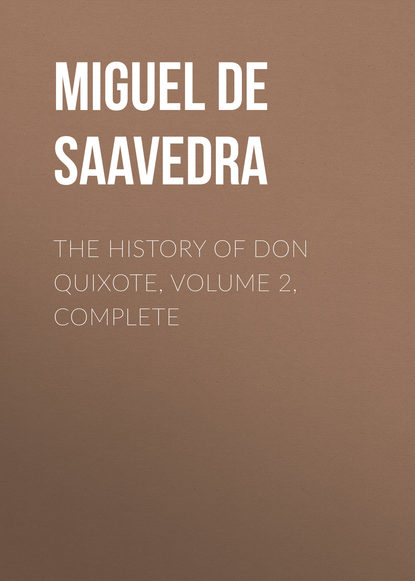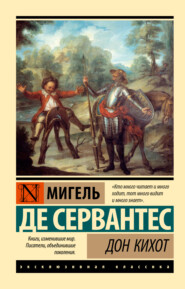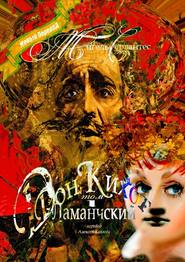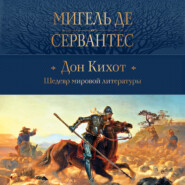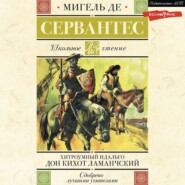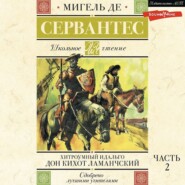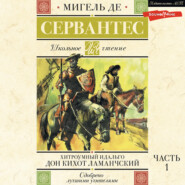По всем вопросам обращайтесь на: info@litportal.ru
(©) 2003-2025.
✖
The History of Don Quixote, Volume 2, Complete
Настройки чтения
Размер шрифта
Высота строк
Поля
“The fact is,” continued Sancho, “that, as your worship knows better than I do, we are all of us liable to death, and to-day we are, and to-morrow we are not, and the lamb goes as soon as the sheep, and nobody can promise himself more hours of life in this world than God may be pleased to give him; for death is deaf, and when it comes to knock at our life’s door, it is always urgent, and neither prayers, nor struggles, nor sceptres, nor mitres, can keep it back, as common talk and report say, and as they tell us from the pulpits every day.”
“All that is very true,” said Don Quixote; “but I cannot make out what thou art driving at.”
“What I am driving at,” said Sancho, “is that your worship settle some fixed wages for me, to be paid monthly while I am in your service, and that the same be paid me out of your estate; for I don’t care to stand on rewards which either come late, or ill, or never at all; God help me with my own. In short, I would like to know what I am to get, be it much or little; for the hen will lay on one egg, and many littles make a much, and so long as one gains something there is nothing lost. To be sure, if it should happen (what I neither believe nor expect) that your worship were to give me that island you have promised me, I am not so ungrateful nor so grasping but that I would be willing to have the revenue of such island valued and stopped out of my wages in due promotion.”
“Sancho, my friend,” replied Don Quixote, “sometimes proportion may be as good as promotion.”
“I see,” said Sancho; “I’ll bet I ought to have said proportion, and not promotion; but it is no matter, as your worship has understood me.”
“And so well understood,” returned Don Quixote, “that I have seen into the depths of thy thoughts, and know the mark thou art shooting at with the countless shafts of thy proverbs. Look here, Sancho, I would readily fix thy wages if I had ever found any instance in the histories of the knights-errant to show or indicate, by the slightest hint, what their squires used to get monthly or yearly; but I have read all or the best part of their histories, and I cannot remember reading of any knight-errant having assigned fixed wages to his squire; I only know that they all served on reward, and that when they least expected it, if good luck attended their masters, they found themselves recompensed with an island or something equivalent to it, or at the least they were left with a title and lordship. If with these hopes and additional inducements you, Sancho, please to return to my service, well and good; but to suppose that I am going to disturb or unhinge the ancient usage of knight-errantry, is all nonsense. And so, my Sancho, get you back to your house and explain my intentions to your Teresa, and if she likes and you like to be on reward with me, bene quidem; if not, we remain friends; for if the pigeon-house does not lack food, it will not lack pigeons; and bear in mind, my son, that a good hope is better than a bad holding, and a good grievance better than a bad compensation. I speak in this way, Sancho, to show you that I can shower down proverbs just as well as yourself; and in short, I mean to say, and I do say, that if you don’t like to come on reward with me, and run the same chance that I run, God be with you and make a saint of you; for I shall find plenty of squires more obedient and painstaking, and not so thickheaded or talkative as you are.”
When Sancho heard his master’s firm, resolute language, a cloud came over the sky with him and the wings of his heart drooped, for he had made sure that his master would not go without him for all the wealth of the world; and as he stood there dumbfoundered and moody, Samson Carrasco came in with the housekeeper and niece, who were anxious to hear by what arguments he was about to dissuade their master from going to seek adventures. The arch wag Samson came forward, and embracing him as he had done before, said with a loud voice, “O flower of knight-errantry! O shining light of arms! O honour and mirror of the Spanish nation! may God Almighty in his infinite power grant that any person or persons, who would impede or hinder thy third sally, may find no way out of the labyrinth of their schemes, nor ever accomplish what they most desire!” And then, turning to the housekeeper, he said, “Mistress housekeeper may just as well give over saying the prayer of Santa Apollonia, for I know it is the positive determination of the spheres that Senor Don Quixote shall proceed to put into execution his new and lofty designs; and I should lay a heavy burden on my conscience did I not urge and persuade this knight not to keep the might of his strong arm and the virtue of his valiant spirit any longer curbed and checked, for by his inactivity he is defrauding the world of the redress of wrongs, of the protection of orphans, of the honour of virgins, of the aid of widows, and of the support of wives, and other matters of this kind appertaining, belonging, proper and peculiar to the order of knight-errantry. On, then, my lord Don Quixote, beautiful and brave, let your worship and highness set out to-day rather than to-morrow; and if anything be needed for the execution of your purpose, here am I ready in person and purse to supply the want; and were it requisite to attend your magnificence as squire, I should esteem it the happiest good fortune.”
At this, Don Quixote, turning to Sancho, said, “Did I not tell thee, Sancho, there would be squires enough and to spare for me? See now who offers to become one; no less than the illustrious bachelor Samson Carrasco, the perpetual joy and delight of the courts of the Salamancan schools, sound in body, discreet, patient under heat or cold, hunger or thirst, with all the qualifications requisite to make a knight-errant’s squire! But heaven forbid that, to gratify my own inclination, I should shake or shatter this pillar of letters and vessel of the sciences, and cut down this towering palm of the fair and liberal arts. Let this new Samson remain in his own country, and, bringing honour to it, bring honour at the same time on the grey heads of his venerable parents; for I will be content with any squire that comes to hand, as Sancho does not deign to accompany me.”
“I do deign,” said Sancho, deeply moved and with tears in his eyes; “it shall not be said of me, master mine,” he continued, “‘the bread eaten and the company dispersed.’ Nay, I come of no ungrateful stock, for all the world knows, but particularly my own town, who the Panzas from whom I am descended were; and, what is more, I know and have learned, by many good words and deeds, your worship’s desire to show me favour; and if I have been bargaining more or less about my wages, it was only to please my wife, who, when she sets herself to press a point, no hammer drives the hoops of a cask as she drives one to do what she wants; but, after all, a man must be a man, and a woman a woman; and as I am a man anyhow, which I can’t deny, I will be one in my own house too, let who will take it amiss; and so there’s nothing more to do but for your worship to make your will with its codicil in such a way that it can’t be provoked, and let us set out at once, to save Senor Samson’s soul from suffering, as he says his conscience obliges him to persuade your worship to sally out upon the world a third time; so I offer again to serve your worship faithfully and loyally, as well and better than all the squires that served knights-errant in times past or present.”
The bachelor was filled with amazement when he heard Sancho’s phraseology and style of talk, for though he had read the first part of his master’s history he never thought that he could be so droll as he was there described; but now, hearing him talk of a “will and codicil that could not be provoked,” instead of “will and codicil that could not be revoked,” he believed all he had read of him, and set him down as one of the greatest simpletons of modern times; and he said to himself that two such lunatics as master and man the world had never seen. In fine, Don Quixote and Sancho embraced one another and made friends, and by the advice and with the approval of the great Carrasco, who was now their oracle, it was arranged that their departure should take place three days thence, by which time they could have all that was requisite for the journey ready, and procure a closed helmet, which Don Quixote said he must by all means take. Samson offered him one, as he knew a friend of his who had it would not refuse it to him, though it was more dingy with rust and mildew than bright and clean like burnished steel.
The curses which both housekeeper and niece poured out on the bachelor were past counting; they tore their hair, they clawed their faces, and in the style of the hired mourners that were once in fashion, they raised a lamentation over the departure of their master and uncle, as if it had been his death. Samson’s intention in persuading him to sally forth once more was to do what the history relates farther on; all by the advice of the curate and barber, with whom he had previously discussed the subject. Finally, then, during those three days, Don Quixote and Sancho provided themselves with what they considered necessary, and Sancho having pacified his wife, and Don Quixote his niece and housekeeper, at nightfall, unseen by anyone except the bachelor, who thought fit to accompany them half a league out of the village, they set out for El Toboso, Don Quixote on his good Rocinante and Sancho on his old Dapple, his alforjas furnished with certain matters in the way of victuals, and his purse with money that Don Quixote gave him to meet emergencies. Samson embraced him, and entreated him to let him hear of his good or evil fortunes, so that he might rejoice over the former or condole with him over the latter, as the laws of friendship required. Don Quixote promised him he would do so, and Samson returned to the village, and the other two took the road for the great city of El Toboso.
CHAPTER VIII.
WHEREIN IS RELATED WHAT BEFELL DON QUIXOTE ON HIS WAY TO SEE HIS LADY DULCINEA DEL TOBOSO
“Blessed be Allah the all-powerful!” says Hamete Benengeli on beginning this eighth chapter; “blessed be Allah!” he repeats three times; and he says he utters these thanksgivings at seeing that he has now got Don Quixote and Sancho fairly afield, and that the readers of his delightful history may reckon that the achievements and humours of Don Quixote and his squire are now about to begin; and he urges them to forget the former chivalries of the ingenious gentleman and to fix their eyes on those that are to come, which now begin on the road to El Toboso, as the others began on the plains of Montiel; nor is it much that he asks in consideration of all he promises, and so he goes on to say:
Don Quixote and Sancho were left alone, and the moment Samson took his departure, Rocinante began to neigh, and Dapple to sigh, which, by both knight and squire, was accepted as a good sign and a very happy omen; though, if the truth is to be told, the sighs and brays of Dapple were louder than the neighings of the hack, from which Sancho inferred that his good fortune was to exceed and overtop that of his master, building, perhaps, upon some judicial astrology that he may have known, though the history says nothing about it; all that can be said is, that when he stumbled or fell, he was heard to say he wished he had not come out, for by stumbling or falling there was nothing to be got but a damaged shoe or a broken rib; and, fool as he was, he was not much astray in this.
Said Don Quixote, “Sancho, my friend, night is drawing on upon us as we go, and more darkly than will allow us to reach El Toboso by daylight; for there I am resolved to go before I engage in another adventure, and there I shall obtain the blessing and generous permission of the peerless Dulcinea, with which permission I expect and feel assured that I shall conclude and bring to a happy termination every perilous adventure; for nothing in life makes knights-errant more valorous than finding themselves favoured by their ladies.”
“So I believe,” replied Sancho; “but I think it will be difficult for your worship to speak with her or see her, at any rate where you will be able to receive her blessing; unless, indeed, she throws it over the wall of the yard where I saw her the time before, when I took her the letter that told of the follies and mad things your worship was doing in the heart of Sierra Morena.”
“Didst thou take that for a yard wall, Sancho,” said Don Quixote, “where or at which thou sawest that never sufficiently extolled grace and beauty? It must have been the gallery, corridor, or portico of some rich and royal palace.”
“It might have been all that,” returned Sancho, “but to me it looked like a wall, unless I am short of memory.”
“At all events, let us go there, Sancho,” said Don Quixote; “for, so that I see her, it is the same to me whether it be over a wall, or at a window, or through the chink of a door, or the grate of a garden; for any beam of the sun of her beauty that reaches my eyes will give light to my reason and strength to my heart, so that I shall be unmatched and unequalled in wisdom and valour.”
“Well, to tell the truth, senor,” said Sancho, “when I saw that sun of the lady Dulcinea del Toboso, it was not bright enough to throw out beams at all; it must have been, that as her grace was sifting that wheat I told you of, the thick dust she raised came before her face like a cloud and dimmed it.”
“What! dost thou still persist, Sancho,” said Don Quixote, “in saying, thinking, believing, and maintaining that my lady Dulcinea was sifting wheat, that being an occupation and task entirely at variance with what is and should be the employment of persons of distinction, who are constituted and reserved for other avocations and pursuits that show their rank a bowshot off? Thou hast forgotten, O Sancho, those lines of our poet wherein he paints for us how, in their crystal abodes, those four nymphs employed themselves who rose from their loved Tagus and seated themselves in a verdant meadow to embroider those tissues which the ingenious poet there describes to us, how they were worked and woven with gold and silk and pearls; and something of this sort must have been the employment of my lady when thou sawest her, only that the spite which some wicked enchanter seems to have against everything of mine changes all those things that give me pleasure, and turns them into shapes unlike their own; and so I fear that in that history of my achievements which they say is now in print, if haply its author was some sage who is an enemy of mine, he will have put one thing for another, mingling a thousand lies with one truth, and amusing himself by relating transactions which have nothing to do with the sequence of a true history. O envy, root of all countless evils, and cankerworm of the virtues! All the vices, Sancho, bring some kind of pleasure with them; but envy brings nothing but irritation, bitterness, and rage.”
“So I say too,” replied Sancho; “and I suspect in that legend or history of us that the bachelor Samson Carrasco told us he saw, my honour goes dragged in the dirt, knocked about, up and down, sweeping the streets, as they say. And yet, on the faith of an honest man, I never spoke ill of any enchanter, and I am not so well off that I am to be envied; to be sure, I am rather sly, and I have a certain spice of the rogue in me; but all is covered by the great cloak of my simplicity, always natural and never acted; and if I had no other merit save that I believe, as I always do, firmly and truly in God, and all the holy Roman Catholic Church holds and believes, and that I am a mortal enemy of the Jews, the historians ought to have mercy on me and treat me well in their writings. But let them say what they like; naked was I born, naked I find myself, I neither lose nor gain; nay, while I see myself put into a book and passed on from hand to hand over the world, I don’t care a fig, let them say what they like of me.”
“That, Sancho,” returned Don Quixote, “reminds me of what happened to a famous poet of our own day, who, having written a bitter satire against all the courtesan ladies, did not insert or name in it a certain lady of whom it was questionable whether she was one or not. She, seeing she was not in the list of the poet, asked him what he had seen in her that he did not include her in the number of the others, telling him he must add to his satire and put her in the new part, or else look out for the consequences. The poet did as she bade him, and left her without a shred of reputation, and she was satisfied by getting fame though it was infamy. In keeping with this is what they relate of that shepherd who set fire to the famous temple of Diana, by repute one of the seven wonders of the world, and burned it with the sole object of making his name live in after ages; and, though it was forbidden to name him, or mention his name by word of mouth or in writing, lest the object of his ambition should be attained, nevertheless it became known that he was called Erostratus. And something of the same sort is what happened in the case of the great emperor Charles V and a gentleman in Rome. The emperor was anxious to see that famous temple of the Rotunda, called in ancient times the temple ‘of all the gods,’ but now-a-days, by a better nomenclature, ‘of all the saints,’ which is the best preserved building of all those of pagan construction in Rome, and the one which best sustains the reputation of mighty works and magnificence of its founders. It is in the form of a half orange, of enormous dimensions, and well lighted, though no light penetrates it save that which is admitted by a window, or rather round skylight, at the top; and it was from this that the emperor examined the building. A Roman gentleman stood by his side and explained to him the skilful construction and ingenuity of the vast fabric and its wonderful architecture, and when they had left the skylight he said to the emperor, ‘A thousand times, your Sacred Majesty, the impulse came upon me to seize your Majesty in my arms and fling myself down from yonder skylight, so as to leave behind me in the world a name that would last for ever.’ ‘I am thankful to you for not carrying such an evil thought into effect,’ said the emperor, ‘and I shall give you no opportunity in future of again putting your loyalty to the test; and I therefore forbid you ever to speak to me or to be where I am; and he followed up these words by bestowing a liberal bounty upon him. My meaning is, Sancho, that the desire of acquiring fame is a very powerful motive. What, thinkest thou, was it that flung Horatius in full armour down from the bridge into the depths of the Tiber? What burned the hand and arm of Mutius? What impelled Curtius to plunge into the deep burning gulf that opened in the midst of Rome? What, in opposition to all the omens that declared against him, made Julius Caesar cross the Rubicon? And to come to more modern examples, what scuttled the ships, and left stranded and cut off the gallant Spaniards under the command of the most courteous Cortes in the New World? All these and a variety of other great exploits are, were and will be, the work of fame that mortals desire as a reward and a portion of the immortality their famous deeds deserve; though we Catholic Christians and knights-errant look more to that future glory that is everlasting in the ethereal regions of heaven than to the vanity of the fame that is to be acquired in this present transitory life; a fame that, however long it may last, must after all end with the world itself, which has its own appointed end. So that, O Sancho, in what we do we must not overpass the bounds which the Christian religion we profess has assigned to us. We have to slay pride in giants, envy by generosity and nobleness of heart, anger by calmness of demeanour and equanimity, gluttony and sloth by the spareness of our diet and the length of our vigils, lust and lewdness by the loyalty we preserve to those whom we have made the mistresses of our thoughts, indolence by traversing the world in all directions seeking opportunities of making ourselves, besides Christians, famous knights. Such, Sancho, are the means by which we reach those extremes of praise that fair fame carries with it.”
“All that your worship has said so far,” said Sancho, “I have understood quite well; but still I would be glad if your worship would dissolve a doubt for me, which has just this minute come into my mind.”
“Solve, thou meanest, Sancho,” said Don Quixote; “say on, in God’s name, and I will answer as well as I can.”
“Tell me, senor,” Sancho went on to say, “those Julys or Augusts, and all those venturous knights that you say are now dead – where are they now?”
“The heathens,” replied Don Quixote, “are, no doubt, in hell; the Christians, if they were good Christians, are either in purgatory or in heaven.”
“Very good,” said Sancho; “but now I want to know – the tombs where the bodies of those great lords are, have they silver lamps before them, or are the walls of their chapels ornamented with crutches, winding-sheets, tresses of hair, legs and eyes in wax? Or what are they ornamented with?”
To which Don Quixote made answer: “The tombs of the heathens were generally sumptuous temples; the ashes of Julius Caesar’s body were placed on the top of a stone pyramid of vast size, which they now call in Rome Saint Peter’s needle. The emperor Hadrian had for a tomb a castle as large as a good-sized village, which they called the Moles Adriani, and is now the castle of St. Angelo in Rome. The queen Artemisia buried her husband Mausolus in a tomb which was reckoned one of the seven wonders of the world; but none of these tombs, or of the many others of the heathens, were ornamented with winding-sheets or any of those other offerings and tokens that show that they who are buried there are saints.”
“That’s the point I’m coming to,” said Sancho; “and now tell me, which is the greater work, to bring a dead man to life or to kill a giant?”
“The answer is easy,” replied Don Quixote; “it is a greater work to bring to life a dead man.”
“Now I have got you,” said Sancho; “in that case the fame of them who bring the dead to life, who give sight to the blind, cure cripples, restore health to the sick, and before whose tombs there are lamps burning, and whose chapels are filled with devout folk on their knees adoring their relics be a better fame in this life and in the other than that which all the heathen emperors and knights-errant that have ever been in the world have left or may leave behind them?”
“That I grant, too,” said Don Quixote.
“Then this fame, these favours, these privileges, or whatever you call it,” said Sancho, “belong to the bodies and relics of the saints who, with the approbation and permission of our holy mother Church, have lamps, tapers, winding-sheets, crutches, pictures, eyes and legs, by means of which they increase devotion and add to their own Christian reputation. Kings carry the bodies or relics of saints on their shoulders, and kiss bits of their bones, and enrich and adorn their oratories and favourite altars with them.”
“What wouldst thou have me infer from all thou hast said, Sancho?” asked Don Quixote.
“My meaning is,” said Sancho, “let us set about becoming saints, and we shall obtain more quickly the fair fame we are striving after; for you know, senor, yesterday or the day before yesterday (for it is so lately one may say so) they canonised and beatified two little barefoot friars, and it is now reckoned the greatest good luck to kiss or touch the iron chains with which they girt and tortured their bodies, and they are held in greater veneration, so it is said, than the sword of Roland in the armoury of our lord the King, whom God preserve. So that, senor, it is better to be an humble little friar of no matter what order, than a valiant knight-errant; with God a couple of dozen of penance lashings are of more avail than two thousand lance-thrusts, be they given to giants, or monsters, or dragons.”
“All that is true,” returned Don Quixote, “but we cannot all be friars, and many are the ways by which God takes his own to heaven; chivalry is a religion, there are sainted knights in glory.”
“Yes,” said Sancho, “but I have heard say that there are more friars in heaven than knights-errant.”
“That,” said Don Quixote, “is because those in religious orders are more numerous than knights.”
“The errants are many,” said Sancho.
“Many,” replied Don Quixote, “but few they who deserve the name of knights.”
With these, and other discussions of the same sort, they passed that night and the following day, without anything worth mention happening to them, whereat Don Quixote was not a little dejected; but at length the next day, at daybreak, they descried the great city of El Toboso, at the sight of which Don Quixote’s spirits rose and Sancho’s fell, for he did not know Dulcinea’s house, nor in all his life had he ever seen her, any more than his master; so that they were both uneasy, the one to see her, the other at not having seen her, and Sancho was at a loss to know what he was to do when his master sent him to El Toboso. In the end, Don Quixote made up his mind to enter the city at nightfall, and they waited until the time came among some oak trees that were near El Toboso; and when the moment they had agreed upon arrived, they made their entrance into the city, where something happened them that may fairly be called something.
CHAPTER IX.
WHEREIN IS RELATED WHAT WILL BE SEEN THERE
‘Twas at the very midnight hour – more or less – when Don Quixote and Sancho quitted the wood and entered El Toboso. The town was in deep silence, for all the inhabitants were asleep, and stretched on the broad of their backs, as the saying is. The night was darkish, though Sancho would have been glad had it been quite dark, so as to find in the darkness an excuse for his blundering. All over the place nothing was to be heard except the barking of dogs, which deafened the ears of Don Quixote and troubled the heart of Sancho. Now and then an ass brayed, pigs grunted, cats mewed, and the various noises they made seemed louder in the silence of the night; all which the enamoured knight took to be of evil omen; nevertheless he said to Sancho, “Sancho, my son, lead on to the palace of Dulcinea, it may be that we shall find her awake.”
“Body of the sun! what palace am I to lead to,” said Sancho, “when what I saw her highness in was only a very little house?”
“Most likely she had then withdrawn into some small apartment of her palace,” said Don Quixote, “to amuse herself with damsels, as great ladies and princesses are accustomed to do.”
“Senor,” said Sancho, “if your worship will have it in spite of me that the house of my lady Dulcinea is a palace, is this an hour, think you, to find the door open; and will it be right for us to go knocking till they hear us and open the door; making a disturbance and confusion all through the household? Are we going, do you fancy, to the house of our wenches, like gallants who come and knock and go in at any hour, however late it may be?”
“Let us first of all find out the palace for certain,” replied Don Quixote, “and then I will tell thee, Sancho, what we had best do; but look, Sancho, for either I see badly, or that dark mass that one sees from here should be Dulcinea’s palace.”





